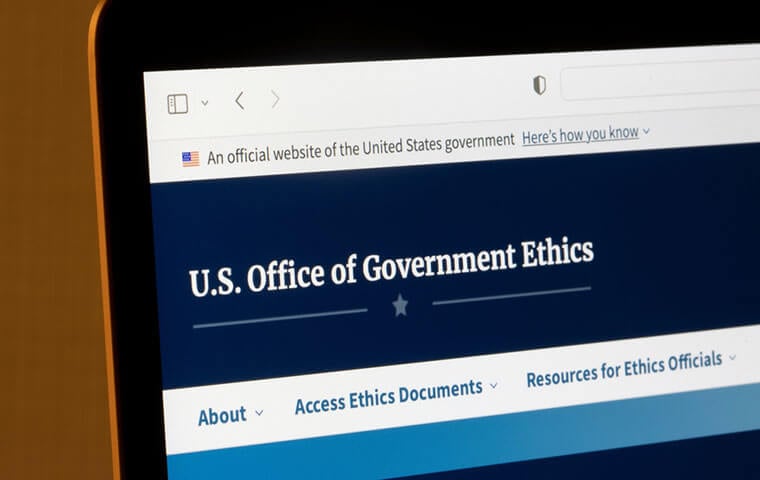 OGE said it receives questions regarding the scope of rules against use of personal office or titles for unofficial purposes. Image: Tada Images/Shutterstock.com
By: FEDweek Staff
OGE said it receives questions regarding the scope of rules against use of personal office or titles for unofficial purposes. Image: Tada Images/Shutterstock.com
By: FEDweek StaffThe Office of Government Ethics has proposed the most thorough overhaul of federal employee ethics rules in three decades, touching on topics ranging from gift-giving policies to financial conflicts and from fundraising to misuse of an official position.
In a lengthy February 21 Federal Register Notice, the OGE said that most of the changes are technical in nature but that many of them address what it called “confusion” in some areas as indicated by the types of questions the agency receives from employees and agencies.
“These revisions will provide greater clarity for executive branch employees and ethics officials. Further, OGE anticipates that this additional clarity will increase compliance and reduce the number of inadvertent violations,” it said.
One area of focus involves gift-giving among employees, in which the current rules focus on restrictions against a lower-paid employee giving a gift to a higher-paid one. The rules would be rewritten to further emphasize the restrictions against a higher-paid employee accepting such gifts.
Other changes would include clarifying that the policy applies even in situations where subordinate employees may be making higher salaries than those overseeing them; to add situations of bereavement to the list of exceptions; and to clarify that “milestone” birthdays do not qualify for an exception. Other changes are to be made reflecting that “OGE frequently receives questions that confuse the restrictions on gifts between employees with the fundraising restrictions” in a separate part of the law.
Similarly, OGE said it receives questions regarding the scope of rules against use of personal office or titles for unofficial purposes. The rules would clarify, for example, that an exception for making job recommendations out of a personal relationship also applies to other settings such as making character references.
Other proposed changes include more sharply defining the scope of rules regarding: conflicting financial interests; payments from former employers; and outside activities that may conflict with official duties. The rules also would be clarified regarding outside teaching, speaking and writing, which it called “one of the most complicated provisions” in ethical standards.
Deferred Resignation Periods about to End for Many; Overall 12% Drop
Retirement Surge Likely as Deferred Resignation Periods End
Senate Rejects Bills to Defer Shutdown; Familiar Process Lies Just Ahead
Senate Bill Would Override Trump Orders against Unions
Report Describes Impact of Shutdown on Employees, Agencies
TSP Adds Detail to Upcoming Roth Conversion Feature
See also,
How to Handle Taxes Owed on TSP Roth Conversions? Use a Ladder
The Best Ages for Federal Employees to Retire
Best States to Retire for Federal Retirees: 2025

